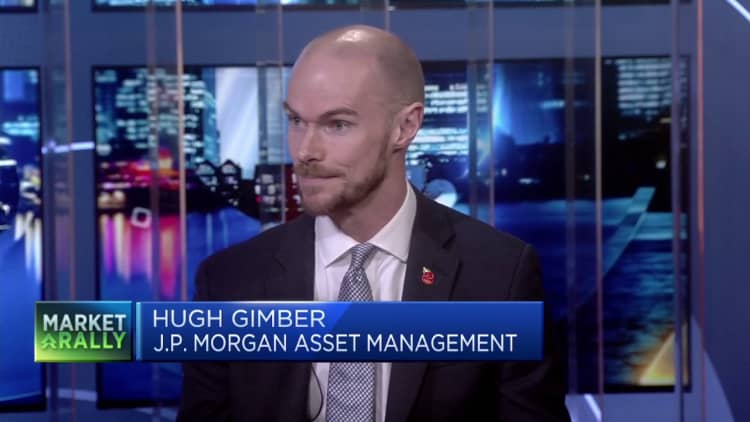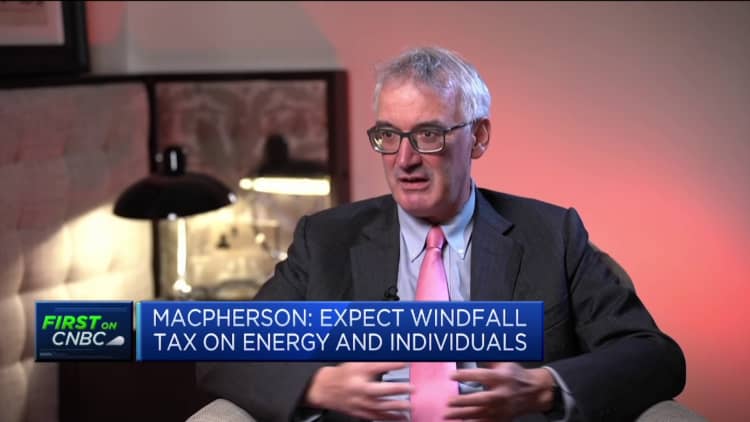[ad_1]
Chancellor of the Exchequer Jeremy Hunt arrives at the back entrance of Downing Street, London.
Aaron Chown – Pa Images | Pa Images | Getty Images
LONDON — New British Finance Minister Jeremy Hunt must weigh the country’s economic peril against his party’s political survival on Thursday as he delivers a long-awaited fiscal statement.
Hunt is expected to announce tax rises and spending cuts totaling between £50 billion ($58.85 billion) and £60 billion per year as he attempts to plug a substantial hole in the country’s public finances, while reassuring the market of its fiscal credibility after the chaos unleashed by former Prime Minister Liz Truss’ disastrous “mini-budget” in late September.
The Bank of England has projected that the U.K. is at the beginning of its longest recession on record, and the Office for National Statistics confirmed on Friday that GDP contracted by 0.2% in the third quarter of 2022.
The Bank is also attempting to wrestle inflation back down to target from the 40-year high of 10.1% seen in September, and earlier this month imposed its largest hike to interest rates since 1989.
“We are going to see everyone paying more tax. We’re going to see spending cuts,” Hunt told the BBC on Sunday, while also promising the government would deliver a new and more focused plan to help with household energy bills beyond April.
Reports have suggested that many of the most radical austerity measures earmarked by new Prime Minister Rishi Sunak’s government will take effect from 2025 onwards, after the next general election.

“The government and the Bank of England find themselves in a very difficult position, because the choice for the chancellor next week is not so much about what’s going to happen — he’s already told the market that the debt forecast needs to be coming down over the next few years — it’s rather the timing,” Hugh Gimber, global markets strategist at JPMorgan Asset Management, told CNBC on Friday.
He added that Hunt faces a key decision between frontloading the pain Sunak’s government has promised to rebalance the economy and delaying the major impact of the new measures in order to prevent further political damage, at risk of prolonging the crisis.
“At the moment, you can make a strong case economically to say frontload it, bring it forward, reduce the amount that the Bank of England has to do in terms of trying to slow the economy down, but politically, clearly there’s a difficult challenge there,” Gimber said.
Most electoral polling in recent weeks gives the main opposition Labour Party around a 20 point lead over Sunak’s ruling Conservatives, indicating that the damage suffered under Truss’ 45-day tenure, and the series of scandals that plagued her predecessor Boris Johnson, has not been unwound by Sunak’s promise of a return to fiscal credibility.
Spending cuts vs. tax hikes
Thursday’s statement will be accompanied by a long-awaited set of projections from the U.K.’s independent Office for Budget Responsibility (OBR), and following the Bank of England’s grim outlook a couple of weeks ago, economists expect a similarly bleak picture to emerge.
In a note Monday, Deutsche Bank said the OBR will likely project a “deep and protracted recession” in 2023, with growth remaining muted until 2025 at the earliest and inflation projections rising significantly to reflect more persistent price increases.
Deutsche also expects the OBR to forecast a slow recovery of the country’s tight labor market, with unemployment rising to around 5.5-6% over the next two to three years.

“All up, the challenging economic outlook will likely underscore the main reason for the size of the fiscal hole, with our borrowing projections pushing a little above GBP 90bn in 2026/27 (OBR Spring Statement. GBP 32bn),” Deutsche Bank Chief U.K. Economist Sanjay Raja said.
Raja expects spending cuts and tax rises to be divided 60:40 in Hunt’s plans, though said these would be done in “stealth,” with tax rises concentrated on freezing personal allowances and tax bands, while reducing the additional tax rate threshold from £150,000 to £125,000 in order to generate more income for the Treasury.
“Away from ‘stealth taxes’, we expect to see a couple more options announced on
Thursday. First, an increase in council tax with local authorities allowed to raise the level of council tax above 3% without a referendum,” Raja said.
“And second, an increase in both the duration and scale of the windfall tax on oil and gas ‘excess profits’.”

In total, Deutsche projects that the “fiscal drag” from stealth taxes and higher windfall taxes will net the Treasury around £35 billion given high inflation and energy prices.
Spending cuts, again executed via “stealth,” could take the form of “nominal cash freezes to departmental budgets,” Raja said, with spending budgets topped up minimally going forward.
“Capex plans are also likely to be trimmed over the coming years, and ‘efficiency savings’ are likely to feature as part of the Chancellor’s plans to fill the fiscal hole,” Raja said.
“This will help offset some of the spending rises expected with welfare and pensions payments now likely to be topped up by inflation rather than earnings growth.”
Market waits with bated breath
The market roundly rejected September’s tax-cutting fiscal announcements from former Finance Minister Kwasi Kwarteng, with sterling sliding to an all-time low and government bond yields spiking so rapidly that the Bank of England was forced to intervene and prevent the collapse of pension funds.
“If he wants to reassure the markets, he will have to announce early action in the form of a big fiscal tightening. That could deepen and/or lengthen the recession and ultimately create an even bigger fiscal hole,” said Ruth Gregory, senior U.K. economist at Capital Economics.
“If he tries to minimise the economic pain, he risks unsettling the markets and prompting another surge in gilt yields, which would also worsen the public finances.”
Capital Economics expects Hunt to reveal fiscal tightening measures to the tune of £54 billion, around 1.9% of GDP, but for this to be funded primarily by nuanced tax hikes rather than spending cuts, with most policies “starting later rather than sooner,” Gregory said.
[ad_2]
